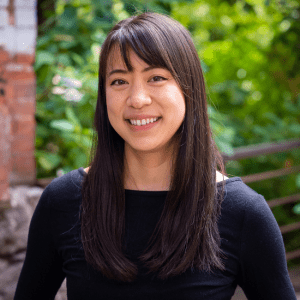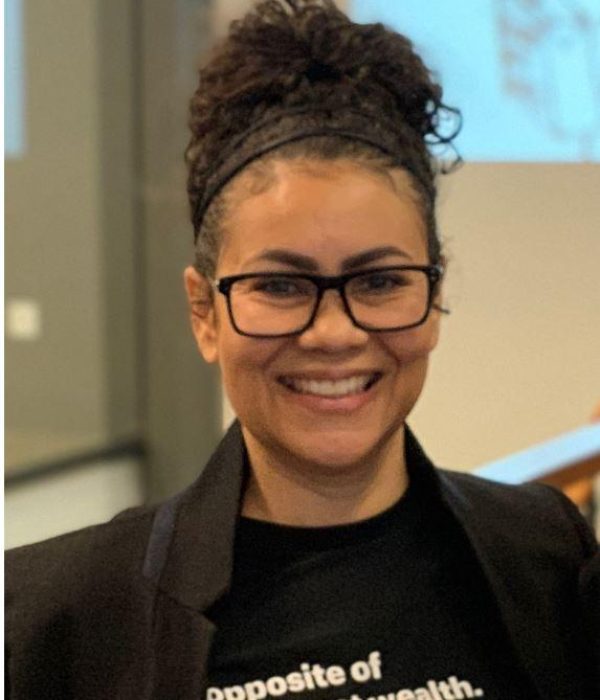
Communications Coordinator
Earlier this summer, Director of Communications Doe Hatfield and Communications Coordinator Emilie Chen spoke with new board member Cat Goughnour. Cat has been a critical partner in helping to shape the organization’s racial equity work, since she first consulted with us in 2016 on our first Racial Equity Action Plan.
Now on our blog, we share our conversation with Cat, as she reflected her career, her family history in rural Oregon and Portland, and the eclectic influences that have shaped her approach to community-led placemaking.
Cat, we are so proud to welcome you to our board and thank you for making the time to talk to us. Let’s jump in with where do you see the intersection between Ecotrust and your work, and what got you excited to join our board?
I absolutely love Ecotrust. It was the first place I presented my community economic development work. In 2013, I contracted a consultant to help me make a map of the migration of Black people in Portland, based on the Cornerstones of Community: Buildings of Portland’s African American History report. As I thought about the nexus of placemaking, placekeeping, and community wealth, I was asking questions about the current value of the land that Black people owned in Portland before gentrification. The invitation to talk with Ecotrust staff during a Learn and Lunch informed my understanding of the people and work of Ecotrust. I was inspired to encounter a nonprofit that actually thinks about addressing the root causes of social and economic issues alongside sustainability, that also draws connections between rural and urban.

Since then, I’ve had an ongoing relationship with Ecotrust. I was contracted as an equity consultant to help the organization operationalize racial equity, I was on the panel on data tools to help drive health equity grounded in my work on Right to Root: A Community-Centered System for Equitable Development, and I interviewed Bob Friedman last summer. Having grown up on a sustainable subsistence farm in rural Oregon, I’m also intrigued by Ecotrust’s foods, forest, fisheries, farms work, particularly since these industries are the heart of rural economies. Today, there are so many brilliant people who have been impacted by overfishing, deforestation, and the collapse of economies across rural Oregon who still don’t have access to living wages. Whether it’s urban or rural, people need—as bell hooks called it—a homeplace, a place they can stay over time and invest their work, wealth, and wisdom and reap prosperity over generations.
You’ve had quite the career fighting for fair housing advocacy and working with organizations to center communities for inclusive and equitable outcomes. I am wondering if you can share a bit about how you get started.
The funny thing is, it’s all happened in a very short amount of time. All my current work started in 2002 when my family migrated from Lincoln County to North Portland to access opportunity. I began my undergrad at Portland State University in 2004 and then went to London School of Economics in 2008. During my time there, I was able to find my voice and passion for human rights, social, economic and racial justice, and systems change.
This training proved to be very important. When I returned from England in 2012, I returned to displacement, houselessness, and joblessness, despite having multiple degrees. My family was very impacted by the gentrification of North Portland. In 2011, we lost our house of 10 years—it was the first stake we had in an urban environment. There was so much promise around the Interstate Corridor Urban Renewal Area. And then I saw how unevenly that development was impacting the neighborhood and how quickly it was stripping away the culture, the economy, and the traditions of the community.
Currently, you’re involved with Prosperity Now, Right 2 Root, and Radix Consulting Group. Would you mind sharing a little bit about each group?
When I came back from England, I became engaged in a number of community advocacy, local and state-wide policy, and equity initiatives. The Equity Baseline Report Part 1: A Framework for Regional Equity I contributed to as a member of the Metro Equity Baseline Workgroup was one of my greatest early accomplishments. This is how Radix Consulting Group began.
“
How do we authentically include the people most impacted—furthest from justice—in decision-making and leadership?
The name Radix is Latin for “root”—like the word “radical.” When I was going through school, people often said to me, “Oh, that’s too radical.” And I thought, let me look this word up, because I feel like it’s kind of a compliment. When I looked it up and saw that it means “root” and “getting to the root,” I thought, “That’s absolutely what I do, as a structural, systemic, institutional, macro thinker.”
Even while un- and under-employed, I worked doggedly on equitable development, land use and access, right to return, and repatriation actions. I focused on the macro instead of micro, seeking upstream solutions to downstream problems, while learning about tools of development and design alongside organizers and experts in Anti-Displacement PDX, EcoDistricts, architects, and urban planners. I was doing policy and advocacy work, thinking, “Well, this is promising—but what about the people? How do we authentically include the people most impacted—furthest from justice—in decision-making and leadership?”
I see forced impoverishment—people who are, ironically, both marginalized and exploited by society—as the driver of gentrification. Exclusion is driven by devaluation. But, what if we were able to own our economies, make our own services and products, innovate our environment to be more health-promoting so that we might heal—not only access what we’re allowed to? That thinking was the underpinning of the Right 2 Root Campaign.
Based on my understanding of the drivers of gentrification and the understanding that “social problems have design solutions,” in 2014, I brought in architects and design collaborators, and created a community-level engagement process to re-envision what our Black community would look like if we were the architects and the planners of our own lives. I used a public health frame, popularized by Dr. Mindy Fullilove’s theory of rootshock, to articulate not only how the social determinants of health are vital to understanding the drivers of inequality, but also to highlight how the loss of home and place contribute to chronic and acute stress that drive underlying health and wealth conditions. Research now proves that our ZIP code is more determinative of health and wealth than our genetic code. Nurture trumps nature; inequality is literally making us sick.
“
If we don’t let the system and society define us, who knows what we’re capable of?
At the same time I was doing Right 2 Root, I worked for a couple of years at Self Enhancement, Inc. and was asked to help write an application for the African American Financial Capability Initiative, a project funded by Northwest Area Foundation granted technical assistance by Prosperity Now. I’ve been a part of Prosperity Now’s Racial Wealth Divide Initiative for over three years now and very much enjoy my work on racial economic and wealth equity. As an Associate Director of Racial Wealth Equity, I continue to use human-centered design to serve the people most impacted by injustice through data, research, program design, and system change. Our work amplifies the visions, the values, and the needs of the people—to create sequential pipelines and pathways that impact the economic lives of BIPOC people, so that they can lead self-determined lives and thrive.
You use so many different approaches and modes of thought—I feel like you have your own methodology that is diverse and unique. What are some of the roots of that?
I’m going to give you the most honest answer: My parents were hippies. The people that I grew up with in rural Oregon were brilliant. My dad used to build solar panels out in the country and later worked for a wind turbine company—jobs in sustainable energy were quite rare at the time. My mom is inimitable. She’s an inveterate skills collector. My mom always taught me to look for what isn’t there, to read between the lines. For many years, I was an artist. I was a clothing designer for 10 years. And I was a waitress from 17 to 30, because my high school guidance counselor told me that I probably should settle for whatever kind of jobs were around.
“
My mom is my rock, even 3,000 miles away. She is my placemaker and placekeeper.
My experiences—as a woman, as somebody from rural poverty—helped me understand how to leverage the things that people don’t traditionally think of as power. The things that I really value about my family and myself were stigmatized, stereotyped, and caused me to experience exclusion. As a form of self-protection, I dropped out—was pushed out—of high school. Today, in my professional life, I leverage my personal experiences as sources of privilege; I use data to my advantage. It is so depressing, but it is also so powerful.
My passion for this work stems from my love of the people who come from the places that I come from, and being able to explain to them, “Listen, it’s not even like I was kind of like you—I was you. And if we don’t let the system and society define us, who knows what we’re capable of?”
Thank you for that, Cat. For our last question, we know you live in Washington, D.C. right now, but you have deep Northwest roots. What’s the most meaningful place to you here?
My homeplace is wherever my mom is. No matter what I’ve experienced—I was in New York when September 11 happened, in England when the riots happened, now in DC during these pandemics—my mom is my rock, even 3,000 miles away. She is my placemaker and placekeeper. She’s the one who has believed in my ability to excel at all the work I’m doing. She and her ancestors are the reason I do—and can do—what I do.